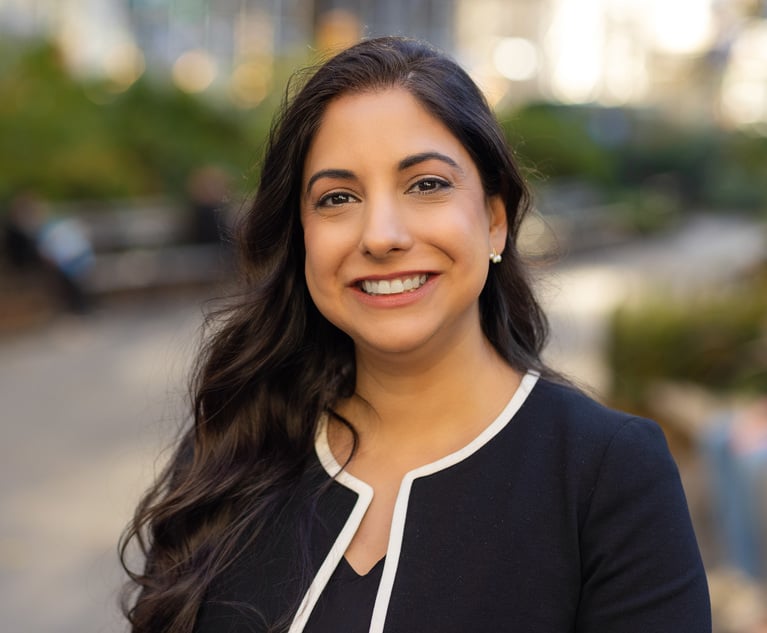Child Sex Abuse Bill Top Priority for New NY Senate Judiciary Chair
Before his time in the Senate, Hoylman was general counsel and an executive vice president at the Partnership for New York City, a business trade organization. He also held positions at Paul, Weiss, Rifkind, Wharton & Garrison and Frankfurt Kurnit Klein & Selz, both in Manhattan.
December 26, 2018 at 11:01 AM
7 minute read
 caption
caption
State Sen. Brad Hoylman is set to be the first Democrat to chair the New York State Senate Judiciary Committee in nearly a decade when the new legislative session opens in January, and he said he is preparing to hit the ground running with legislation addressing the statute of limitations in cases of child sex abuse and a closer look at federal immigration agents in the state's courtrooms.
He's not unfamiliar with the position. Hoylman has served as the highest-ranking Democrat on the committee for the last two years. He was first elected to the Senate in 2012.
Before his time in the Senate, Hoylman was general counsel and an executive vice president at the Partnership for New York City, a business trade organization. He also held positions at Paul, Weiss, Rifkind, Wharton & Garrison and Frankfurt Kurnit Klein & Selz, both in Manhattan.
He will replace current Judiciary Chair Sen. John Bonacic, R-Orange, next month when Democrats become the majority party in the Senate.
The position is among the highest-ranking in the Legislature when it comes to the state's courts. The committee screens judicial appointees before they go to the Senate floor for a vote. It also reviews legislation that will impact the state's courts and the Office of Court Administration.
Hoylman, in an interview with the New York Law Journal, laid out his priorities for the upcoming legislative session as the new chair of the Judiciary Committee. His answers have been edited for clarity and editorial style.
Q: Have you thought about what your first priorities will be as the new chair of the Judiciary Committee?
A: I look at the priorities through the lens of the Senate Democratic agenda, and at the top of that list is the Child Victims Act, which would lift the statute of limitations in cases of child sexual abuse in criminal and civil matters but also provide a one-year revival period to adult survivors of child sexual abuse in which they could file civil claims against their abusers or the institution that may have harbored them.
Q: Are there any other bills that you're looking at right now?
A: I think the issue of access to justice is incredibly important. Certainly another one in a similar theme is creating what's called an Extreme Risk Protection Order, as it pertains to gun safety. It would allow individuals, family members or police to seek a court order to temporarily restrict an individual's access to a handgun if they're in danger of harming themselves or other people. It's a top priority among gun safety advocates and Senate Democrats.
Q: There are some criminal justice bills that may not go through the Judiciary Committee but would still affect the judiciary. Do you have a position on discovery reform and speedy trial reform as of right now?
A: I'm supportive of legislation to reform discovery and hastening trials. I've been a co-sponsor of legislation in that regard. It's something I believe is important to the conference and to the extent that I can support that legislation through my position as the chair of the Judiciary Committee, I will very affirmatively participate.
Q: Would the legislation provide for open-file discovery, or some other discovery reform?
A: I think the former, but there are many proposals in both of these areas. So, we'll be refining that, and I'm eager to work with my colleagues and advocates in refining which bill. That's the same in the case of the Child Victims Act, too. There isn't one necessarily best bill at the moment. But by the time session begins we'll have a better sense. When you're in the minority, there are a lot of bills and they're often one-house. So, the Senate has proposed multiple bills in these areas. We'll be looking for that best-in-class bill on these topic areas.
Q: In your position, you'll be working closely with Chief Judge Janet DiFiore. How is your relationship with her, and how do you think she's done as the state's chief judge since she took that position?
A: I have a very cordial relationship with the chief judge. I've been impressed by what she's been able to do in just a couple of years with her Excellence Initiative in reducing the backlog of cases in most courts. I think it's my job to fight for resources for her so she and her colleagues can administer justice as smoothly and efficiently as possible.
Q: Do you think it's time to provide more funding to the Office of Court Administration and New York state's courts?
A: Yes. I've seen their budget proposal. The amount is within the 2 percent increase the governor has suggested as a cap. If they need more money to do their job, I believe they should receive it. But the proposal at the moment is within that 2 percent cap.
Q: Is there anything you would like to see changed administratively by the chief judge or OCA that you think could improve the state's court system?
A: We want to fill vacancies as quickly as possible. We want to have hearings in those areas where there are vacancies of judicial candidates, while recognizing that they are an independent branch of government and that separation of powers is an important concept that's being undermined at the federal level by the Trump administration. So, we have to value an independent judiciary. But, specifically to changes, I look to Judge Kaye's report on restructuring the court and it's something I want to dig into.
Q: Is there any measure the state Legislature could pass to improve the state's court system?
A: I'll be looking at that possibility for certain in terms of what I learn during budget hearings and as we move forward, but at the moment I haven't yet embraced a wholesale approach on such a complicated issue at this early stage.
Q: You mentioned the Trump administration. What role can state courts play in defending the state against the Trump administration?
A: For one thing, [U.S. Immigration and Customs Enforcement] officers in state courts is something we need to resist. Those who live in our state should not be deported without due process of law, and that's something I'll be looking at more closely in the new session. [The Suazo decision] is a good case study in how the court can defend against Trump by recognizing that the deportation policy necessitates a right to a trial by jury.
Q: Sen. John Bonacic said earlier this year that the Legislature should authorize more State Supreme Court judges to run for office so Court of Claims judges don't have to preside over State Supreme Court cases. Is that something you have a position on?
A: Generally, I agree with Sen. Bonacic, but we need to take a closer look.
Q: Are there any other issues you're looking at?
A: There's the issue of confessions of judgement. It's basically a way for a party through a contract to obtain a judgement without having to bring a lawsuit. New York, unlike other states, allows these confessions of judgement. It's particularly punitive to small businesses and extremely favorable to predatory lenders who take advantage of the fine print. So, I'm looking at reform in that area.
READ MORE:
New York State Needs More Judges, Outgoing Senate Judiciary Chairman Says
Manhattan Democrat Hoylman Selected to Be New NY Senate Judiciary Committee Chairman
This content has been archived. It is available through our partners, LexisNexis® and Bloomberg Law.
To view this content, please continue to their sites.
Not a Lexis Subscriber?
Subscribe Now
Not a Bloomberg Law Subscriber?
Subscribe Now
NOT FOR REPRINT
© 2025 ALM Global, LLC, All Rights Reserved. Request academic re-use from www.copyright.com. All other uses, submit a request to [email protected]. For more information visit Asset & Logo Licensing.
You Might Like
View All

Family Law Practitioners Weigh In on Court System's New Joint Divorce Program

Former NY City Hall Official Tied to Adams Corruption Probe to Plead Guilty

New Charges Expected in Sex Trafficking Case Against Broker Brothers
Trending Stories
- 1Connecticut Movers: New Laterals, Expanding Teams
- 2Eliminating Judicial Exceptions: The Promise of the Patent Eligibility Restoration Act
- 3AI in Legal: Disruptive Potential and Practical Realities
- 4One Court’s Opinion on Successfully Bankruptcy Proofing a Borrower
- 5Making the Case for Workflow Automation
Who Got The Work
J. Brugh Lower of Gibbons has entered an appearance for industrial equipment supplier Devco Corporation in a pending trademark infringement lawsuit. The suit, accusing the defendant of selling knock-off Graco products, was filed Dec. 18 in New Jersey District Court by Rivkin Radler on behalf of Graco Inc. and Graco Minnesota. The case, assigned to U.S. District Judge Zahid N. Quraishi, is 3:24-cv-11294, Graco Inc. et al v. Devco Corporation.
Who Got The Work
Rebecca Maller-Stein and Kent A. Yalowitz of Arnold & Porter Kaye Scholer have entered their appearances for Hanaco Venture Capital and its executives, Lior Prosor and David Frankel, in a pending securities lawsuit. The action, filed on Dec. 24 in New York Southern District Court by Zell, Aron & Co. on behalf of Goldeneye Advisors, accuses the defendants of negligently and fraudulently managing the plaintiff's $1 million investment. The case, assigned to U.S. District Judge Vernon S. Broderick, is 1:24-cv-09918, Goldeneye Advisors, LLC v. Hanaco Venture Capital, Ltd. et al.
Who Got The Work
Attorneys from A&O Shearman has stepped in as defense counsel for Toronto-Dominion Bank and other defendants in a pending securities class action. The suit, filed Dec. 11 in New York Southern District Court by Bleichmar Fonti & Auld, accuses the defendants of concealing the bank's 'pervasive' deficiencies in regards to its compliance with the Bank Secrecy Act and the quality of its anti-money laundering controls. The case, assigned to U.S. District Judge Arun Subramanian, is 1:24-cv-09445, Gonzalez v. The Toronto-Dominion Bank et al.
Who Got The Work
Crown Castle International, a Pennsylvania company providing shared communications infrastructure, has turned to Luke D. Wolf of Gordon Rees Scully Mansukhani to fend off a pending breach-of-contract lawsuit. The court action, filed Nov. 25 in Michigan Eastern District Court by Hooper Hathaway PC on behalf of The Town Residences LLC, accuses Crown Castle of failing to transfer approximately $30,000 in utility payments from T-Mobile in breach of a roof-top lease and assignment agreement. The case, assigned to U.S. District Judge Susan K. Declercq, is 2:24-cv-13131, The Town Residences LLC v. T-Mobile US, Inc. et al.
Who Got The Work
Wilfred P. Coronato and Daniel M. Schwartz of McCarter & English have stepped in as defense counsel to Electrolux Home Products Inc. in a pending product liability lawsuit. The court action, filed Nov. 26 in New York Eastern District Court by Poulos Lopiccolo PC and Nagel Rice LLP on behalf of David Stern, alleges that the defendant's refrigerators’ drawers and shelving repeatedly break and fall apart within months after purchase. The case, assigned to U.S. District Judge Joan M. Azrack, is 2:24-cv-08204, Stern v. Electrolux Home Products, Inc.
Featured Firms
Law Offices of Gary Martin Hays & Associates, P.C.
(470) 294-1674
Law Offices of Mark E. Salomone
(857) 444-6468
Smith & Hassler
(713) 739-1250






